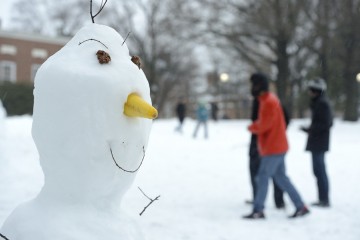Yeah. It snowed again. You probably noticed.
Seriously, Baltimore. What is going with this all of this snowfall?
Well, that's exactly what we decided to talk with Professor Ben Zaitchik about. Zaitchik teaches in the Department of Earth and Planterary Sciences at Johns Hopkins, and his bio says his research is "directed at understanding, managing, and coping with climatic and hydrologic variability."
We think this means we should ask him our snow questions.
So what the heck is going on with our weather?
It seems like what's happening is, we're getting frequent intrusions of polar air into the middle latitudes. Basically, we're seeing more of the Arctic and its influence.
Can you break that down for those of us who only took one required Earth Science class?
Essentially, you can think of climates like this: There's the Arctic, which is freezing cold. And then we're down to middle latitudes, which are more moderate—a lot of that is just about the fact the earth is round, and the angle of sun. But there's also a dynamic way that climates are separated: by jet stream. Now, the jet stream that is most important to us is one that separates the middle and polar latitudes. So we have these really strong east-west winds whipping around the earth, usually just north of us. And those winds act as a barrier in some ways between what's happening in the polar region and what's happening down in our more moderate climate zones.
We're following …
OK. Jet streams have wiggles, and these wiggles are often what bring more extreme weather. Wiggles mix things up in general: the more jet stream wiggles we see, the more variability we see. And variability creates storms.
So the Polar Vortex was created by … wiggles?
Well, there's always a Polar Vortex, but the jet stream kind of has a barrier on it—it's always there, though, kind of circulating air around the North and South Poles. What happens to us when we say, "Oh, we've got a Polar Vortex!" … what that means is the air that's usually contained in by the jet stream dipped all the way down from the poles and became latitudes. So it kind of came down and got us in Baltimore.
Does climate change have an impact on this?
Well, for example, people have hypothesized that as you warm the planet to the greenhouse gases, the polar regions warm faster than other regions. And that's true for multiple reasons. It's also simply true because of the way heat is redistributed around the planet: as the world gets warmer, you expect the Arctic to warm a little faster. And that's been true. The Arctic has been warming at twice the rate of the rest of the globe for the past 50 years at least. Now, if the Arctic is warming faster than we're warming, then the difference in temperature between us and the Arctic gets smaller, right? (Because the Arctic is colder than us, but it's warming faster than us.)
Now, if the difference in temperature between us and the Arctic decreases, then that's going to have a impact on the wiggliness of the jet stream. A really strong temperature gradient is going to really confine that jet stream, which means it's gonna be whipping along really strong. But if you decrease that gradient, then the jet stream is in less of a hurry, and then it might slouch a little more, so you would get more of these wiggles. Again, when there are these wiggles, then you might get more variability, and that's going to include more extreme storms.
Should crazy snowstorms make us freak out about climate change?
There is one credible hypothesis out there that climate change, including the warming of poles, will lead to an increasingly sensitive atmosphere. But that's a hypothesis that is really far from being demonstrated. There's been some observation that, yes, in the past two years we're seeing some more of that. But the time record isn't long enough to understand the increase statistically. Like, maybe it was like this—and I'm just making this up—in the 1940s before we had good records of the polar zones, and now it's back.
It's definitely a hot topic right now in climate science. I know there are some people who have gotten a lot of media attention for saying things like the retreat of the Arctic ice is indeed responsible for the increased wiggliness of the jet stream, and therefore, the extreme weather. And there are a lot of other people who say, either you're premature in that conclusion, or they've got an alternative hypothesis that has nothing to do with that. So I don't think we can say it's about climate change at this point.
Whew …
Now, it's certainly not inconsistent of climate change. So the statement, "Oh, we have some cold weather, and so the climate's not warm"—that's kind of different, right? Like, how does your local weather influence your thinking? We happen to have a cold winter this year. A couple years ago, when we had a frighteningly warm winter with no snow, Europe got frozen out. So I think this stuff just changes year to year … who gets the warm and who gets the cold. Right now we're having cold weather in North America, and London is getting record rainfall.
OK, professor. Thanks for talking with us!
We think the upshot of what Zaitchik is saying is that a global ice age isn't coming, so we should go enjoy the snow. On that note, we're gonna call him back and see if he has any scientific advice for how to geo-engineer the perfect snowcastle. We plan on reenacting scenes from Frozen for the rest of the day.
Posted in Science+Technology
Tagged weather, climate change, ben zaitchik








